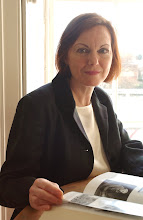 It’s amazing how many connections between Bloomsbury and South Africa are being revealed in this blog. Take the story of Bishop Andrew McLaglen, for example, featured on 8 August. Local historian, Paul Rason, who sent me the story of the Hollywood star’s missionary father, could find no evidence of the clergyman’s claim to be Bishop of Claremont, South Africa. However, I have just been contacted by William de Villiers of Cape Town who has shed light on this mystery.
It’s amazing how many connections between Bloomsbury and South Africa are being revealed in this blog. Take the story of Bishop Andrew McLaglen, for example, featured on 8 August. Local historian, Paul Rason, who sent me the story of the Hollywood star’s missionary father, could find no evidence of the clergyman’s claim to be Bishop of Claremont, South Africa. However, I have just been contacted by William de Villiers of Cape Town who has shed light on this mystery.He writes: ‘I am researching the life and times of the McLaglen family as a private research project. I saw your blog on Bloomsbury People and thought you would be interested to hear about Andrew McLaglen's antecedents. As I understand it, Philip McLACHLAN and Catherina Petronella NEYHOFF, both resident at the Cape of Good Hope, had a son, born out of wedlock. This was Jacobus Petrus McLAGLEN (alias James Philip McLACHLAN), born in Cape Town on 15 January 1820, and baptised on 4 March 1821. He was a printer by trade, but developed mental illness and was confined to Robben Island, where he died on 16 September 1856. He was married at the Cape of Good Hope to Margaretha (Grietje) RUTGERS (she died in 1890). They had seven children, of whom the fifth was Andries Carel Albertus (alias Andrew Charles Albert) McLAGLEN, born on 4 April 1851, and baptised in Cape Town on 27 April 1851.’ This was, indeed, Victor McLaglen’s father. More genealogical details can be seen here.
Andrew Charles Albert McLaglen must have arrived in London sometime before 1877 when he is known to have been working as a probationer missionary with the London City Mission in Bloomsbury. He was either accompanied to England, or subsequently joined here, by his eldest sibling, Catharina (Catherine) Cornelia McLaglen (born August 1842 in Cape Town).
Apparently, the Reverend Andrew was a very active self-publicist, and William sent me the above picture (from an unknown Victorian journal quoting the Christian Herald) showing McLaglen presenting the Zulu King Cetewayo and his chiefs with Zulu bibles and seven copies of the Book of Common Prayer, in the parish of Kensington, 1881. In fact, King Cetewayo (c1826-1884), whose nation suffered defeat by Britain in the Anglo-Zulu War of 1879, actually travelled to England in 1882 to meet with Queen Victoria (1819-1901) in the hope of having his sovereignty restored. Cetewayo was given celebrity status in London and stories about him appeared in a variety of periodicals. This particular event may not, in fact, have taken place. William says that it ‘is breathtaking in its inaccuracy’.
What is accurate, however, is Andrew McLaglen’s consecration on 2 November 1897 as bishop of the Free Protestant Episcopal Church of England. He was consecrated to be ‘Colonial Missionary Bishop and Titular Bishop of Claremont’. The consecration took place in the wood-and-iron building known as St. Stephen's Church in Shrewsbury Road, East Ham, London, by one Leon Chechemian, an Armenian Uniate. The Free Protestant Episcopal Church of England was formed on that same day with the union of the Free Protestant Church, the Ancient British Church, and the Nazarene Episcopal Church. Dr Chechemian was its first Primus. Bishop McLaglen became its primus on 3 December 1920. He never took up his see in Claremont, and died in Lambeth, South London. The Free Protestant Episcopal Church of England (later known as the Evangelical Church of England) was formally dissolved in 1997 although it remains active in the US and Canada.
